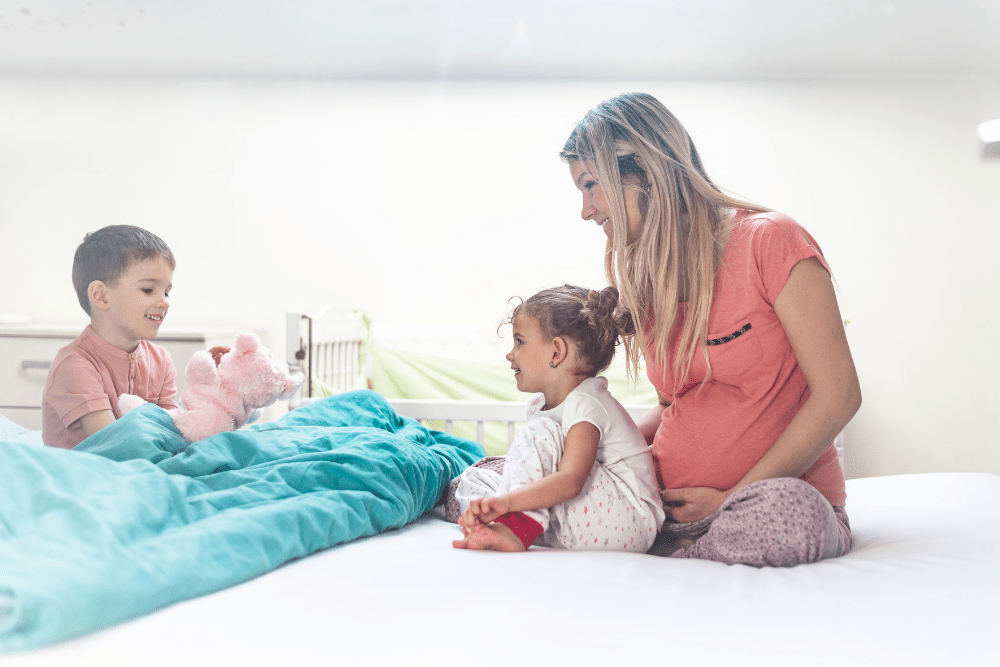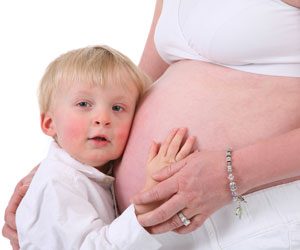
Siblings at birth – how it is possible? Before I became a mother I worked in early childhood development. Much of my time was spent observing and recording children’s developmental capabilities and needs. I use those recordings to write programs for individual children in early childhood settings. I worked with many high university-trained early childhood experts. All of whom could rattle off the theories of Erickson and Piaget, but when it came to actually connect physically and emotionally with children many of them didn’t have a clue.
I personally birthed 4 children in 5 & 1/2 years (all naturally into the water with the last 3 births taking place in my home) and subsequently had my own pre-school at home! This is when I became passionate about issues around childbirth. A self-confessed ‘birth junkie’ studied, attended courses and workshops and became a childbirth educator and doula.
All of my children were involved In the births of their siblings. Their involvement was one of the many reasons I chose to birth at home with the last 3 babies.
I could wax on for ages about the social, emotional, cognitive and physical developmental benefits for children who witness the birth of their siblings. All of these are valid and factual points to make. However, I consider it to be more beneficial to try a little exercise at getting into the mind of a small child.
1st Scenario
Try to cast your mind back to childhood, just try to remember some of the feelings of being in a small body and being a small child. Now remember some Important family events from childhood, it may be Christmas, a family wedding. a birthday, an engagement party. Remember how it made you feel when you were involved in a family event and remember how it made you feel when you were excluded.
For the moment I want you to imagine being a small child – let’s say a 4 year old. Your mummy has told you that there is a baby growing in her tummy, as time goes by you witness mummy’s tummy move and Jump and mummy tells you it’s the baby kicking.
You’re aware of lots of changes occurring. Lots of baby gear is being brought into the house, tiny little clothes are being washed and hung out to dry and mum tells you it won’t be long before the baby arrives. There’s heaps of talk about the new baby from mum and dad and other relatives and friends. One night Daddy tells you that soon mummy will be going to the hospital and that the Dr is going to get the baby out of mummy’s tummy, your imagination runs wild and you have no idea how the Dr will get that baby out. Ahhhh, maybe THAT’S what the belly button is for. you think to yourself.
You’re told that any day now you’re going to be a big sister or brother – chances are you’re not feeling very big at all.
Then one day mum tells you she has some pains in her tummy and that she thinks the baby is on its way, every now and then mum stops what she doing and rocks her hips. You go to bed that night and daddy tells you that ‘It’ might be tonight. When you wake up in the morning Grandma is at your house, she tells you that mummy and daddy have gone to the hospital to have the baby and when daddy calls you’ll be able to go to the hospital to meet the baby.
You have a nice day with Grandma but you’re wondering where mummy is and when and how the baby will show up. Eventually, in the evening Daddy calls to tell you that you have a baby brother. Grandma Is very excited – It’s time to go to the hospital to meet the baby and you feel nervous and excited.
When you arrive at the hospital mum is lying in a bed with a big bundle of blankets on her lap. She smiles at you and you go and give mummy a big kiss. ‘Look’, she says pointing at the blankets and you see a little face looking out. It’s the baby Mummy asks you if you want to hold him, you sit up on the bed and have him on your lap. You’re a bit distracted by strangers coming in and out of the room, some of them smile and talk to you, and others don’t even look at you.
After a while it’s time for Grandma to take you home, daddy says he’ll be back a bit later and that he’ll see you In the morning. Grandma takes you home and tucks you into bed for your good night story. So now you’re a big sister!
2nd Scenario
Now just imagine you’re the same 4-year-old, you know that there is a baby growing in mummy’s tummy. You know that when it is time for the baby to be born mummy will have pains in her tummy and that she might make a lot of noise, but mum said that’s ok because it helps the baby to be born. You have been to visit the midwife lots of times with mum, your favourite part is helping her listen to the baby’s heartbeat – she lets you press the buttons on her machine, and the baby’s heartbeat sounds like a horse galloping. She listens to your heartbeat and she lets you help with the blood pressure machine, sometimes you even get to wee on a stick – Just like a mummy.
You have some special jobs for when mummy is in labour, you have your own camera to take photos, you will help daddy or the midwife fill mummy’s glass with water and put cold washers on her face, this will help to get the baby out. Mummy has told you that the baby will come out of her vagina and that it can sometimes take a long time but that it is ok; the baby will come when it Is ready.
You’ve watched videos of other mummies having babies and other children helping their babies be born. You ask mummy why the dad and mum are crying on the videos, ‘grown-ups sometimes cry happy tears’, she says. You think that’s a bit strange cause when you cry It’s because you’re sad, angry or hurt. Mum reads you books about babies being born and she has even bought you your own special baby doll – but you’re excited about the real baby coming.
One day mummy starts to have some pains in her tummy and she tells you she thinks that the baby might be on its way. Every now and then she stops what she is doing and rocks her hips. That evening daddy comes home from work and you all have dinner together but mum keeps getting up and rocking. Daddy says that It’s bedtime and promises you that if the baby decides that Its going to be born tonight that he will wake you up so you don’t miss out – ‘Promise?’ you ask. ‘Pinky promise’, he says, as you shake your pinkies together.
The next thing you know daddy is waking you up to tell you that the baby is coming. You go into the lounge room and mummy is in the big pool that you helped daddy blow up a few days earlier. The midwife is there too and she smiles and says hello. Mummy is making some big, loud noises and she has her eyes closed. At first, you feel a bit worried, and then she stops making the noise, opens her eyes, looks up at you and smiles. ”The baby’s going to be here soon”, and she squeezes your hand. You help dad with cold washers for mums face and offer her water to drink.
After a while, the midwife says she can see the baby’s head. She shines a torch through the water so that you and dad can see too. Then mum makes some really really loud noises and a baby’s head comes out of her vagina, soon after the baby’s body arrives and the midwife passes him up to mum. Mum and dad cry happy tears as you look on in amazement. Mummy turns around and kisses you, you reach out to touch the baby. You stroke his head and his hands and he squeezes his hand around your little finger.
After a while, the placenta is born and mum gets out of the pool because it’s getting cold. She goes for a shower and daddy helps you cuddle the baby. When the midwife goes home you all jump into mummy and daddy’s big bed to sleep. It will be dad, then you, then the baby, then mum! So now, you’re a big sister or brother!
Why Does It Matter?
Almost every aspect of early childhood development is affected by environment and experiences. It ultimately shapes who we are, and how we view the world and ourselves within it. Children are incredibly robust and have the ability to deal with the majority of situations as long as they are told the truth and the facts of the situation. We can help them by giving them words to express how they feel. However when they are excluded from life’s experiences and left to imagine situations we are unable to help. We can’t protect them from their imagination and nightmares.
Perhaps by not sharing our life experiences with our children, we think we are protecting them. But are we really or are we actually doing them a grave disservice?
Children in our society learn about birth from TV soaps and hospital sitcoms. This is where birth is depicted as an emergency, with overtones of impending catastrophe and final salvation by the OB. They learn that birth means fear, a frantic rush to the hospital and life-saving surgery. We condition children to think of birth as a road accident or a heart attack. These are the first images children see related to birth. What message is this giving our children? How will they use this when it is their turn to have children? Should they indeed want to even try after being bombarded by these images?
Page revised on 14th December 2021


Recent Comments